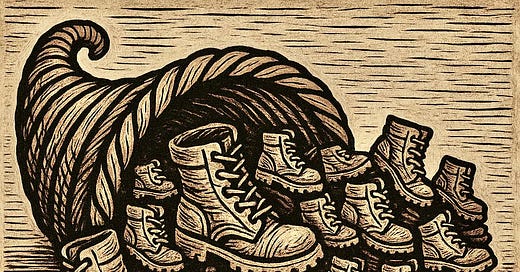Centrism isn't aligned with democracy
Despite what I (and I suppose you too) would have assumed
Way back during the first Trump administration, in May 2018, David Adler posted a paper on SSRN (registration may be required) titled, “The Centrist Paradox: Political Correlates of the Democratic Disconnect.” It appeared almost simultaneously in the New York Times, (paywall possible) as an op-ed titled “Centrists Are the Most Hostile to Democracy, Not Extremists.”
Essential reading! I was so surprised by his findings —and their importance— that I immediately wrote a “jot” (a short appreciation) titled “Does the Center Want to Hold?” for an online journal, Jotwell (Journal of Things We [law profs] Like a Lot). This was my summary:
I had always assumed that if social science places a representative person on a left-center-right political spectrum, and independently measures that person’s attachment to democratic ideals, that social science would find that people toward the extremes tend to have a lesser attachment to the norms of democracy, while people in the middle are more attached. As Adler puts it, “there is an intuition that there is an elective affinity between extreme political views and support for strongman politics to implement them.” Lenin for the left/ Franco for the Right, as it were. No research, he finds, has bothered to test this assumption. And —shockingly—it turns out that the reverse is likelier to be true. People in the center appear to be (for the most part) the least attached to democracy.
Adler reports his analysis of data representing the U.S., the U.K., and a number of E.U. countries from 2008 and 2010-16. He says his results are robust when controlling for variables such as income, education, and age (which have been suggested as factors tending toward “populism”). He is careful to distinguish support for democratic principles from satisfaction with democratic outcomes. While the left and right wings may be less happy with outcomes, it is the center—paradoxically—that is the least happy with the process itself.The heaviest gob-smacker, I wrote, were the findings for the U.S.: “less than half of the political centrists in the United States view free elections as essential to democracy—over thirty percent less than their center-left neighbors.” Think about that. Free elections —the essence of democracy (be it liberal or illiberal) are something that American centrists think are dispensable.
I expected Adler’s thesis to kick up a flurry of debate. Nothing came to my attention. But lately I began to wonder what had become of the Centrist Paradox. This was in connection with the second-coming-of-Trump handwringing among big-D Democrats. The Democratic Centrists have mobilized and declared war on “groups” and raised a hastily scribbled “Abundance Agenda” banner.
When it comes to politics, Democratic Centrists oppose the likes of too-inexperienced and too-extreme whippersnappers like Zorhan Momdani, and instead promote has-beens like prunefaced sex-pest Andrew Cuomo (see my earlier post). Centrism, you see, is necessary to save democracy.
So, today I emailed Adler to ask whether he sticks with his 2018 analysis. This is what he wrote back:
Nice to hear from you. I received a few critical responses, e.g. in newspapers like the Washington Post and academic outlets like the London School of Economics. In my opinion, none of it detracts from the fundamental observation that self-perceived moderates are the most hostile to democracy — and that ideology may be an antidote to authoritarianism, rather than its aid.
Adler doesn’t mean that Centrism (or Moderatism) can itself be considered an ideology that might serve as an antidote to authoritarianism. Centrism, however defined, favors whatever appears to lie in the center. As has been repeatedly observed, the center in the U.S. and the West is not where it used to be. And it is still on the move.



